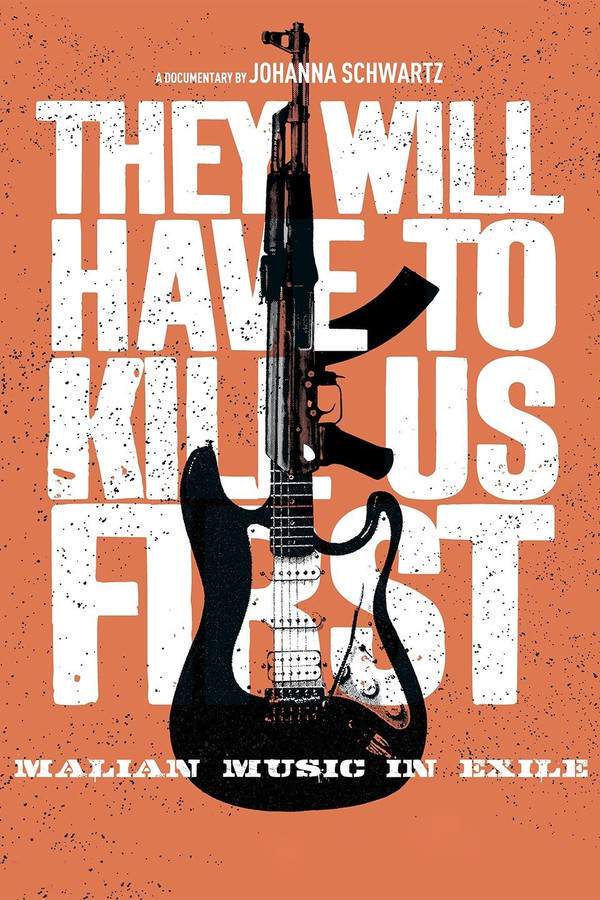
They Will Have to Kill Us First 2016
Directed by

Johanna Schwartz
Made by

BBC Worldwide Americas
Test your knowledge of They Will Have to Kill Us First with our quiz!
They Will Have to Kill Us First Plot Summary
Read the complete plot summary and ending explained for They Will Have to Kill Us First (2016). From turning points to emotional moments, uncover what really happened and why it matters.
In the face of oppression, Mali’s beloved musicians refuse to surrender their art as Islamic extremists impose a harsh ban on music throughout the region. They Will Have To Kill Us First eloquently narrates the courageous journey of these talented artists as they strive to reclaim their right to sing and express themselves freely.
With a specially commissioned soundtrack featuring the exceptional talents of Khaira Arby, Fadimata Disco Walet Oumar, Amkoullel, Moussa Sidi, and the up-and-coming group Songhoy Blues, this film serves as a vibrant testament to the power of music in overcoming adversity. The heart of Malian culture beats strongly through these artists, who find themselves in a desperate battle against oppressive forces.
In 2012, when Islamic jihadists seized control of northern Mali, they implemented one of the most severe interpretations of sharia law, declaring an outright ban on all music. This resulted in the destruction of radio stations, the burning of musical instruments, and left countless musicians facing unimaginable risks, including torture and even death. Consequently, many of these esteemed artists were forced to hide away or seek refuge in exile, where sadly, many remain even to this day.
However, rather than relinquish their craft to silence, these resilient musicians are bravely fighting back. They are steadfast in protecting their cultural heritage and identity, wielding their music as a powerful weapon against the ongoing violence that has decimated their homeland. The film They Will Have To Kill Us First brings to light the harrowing experiences of musicians on the run, portrays the tumultuous uprising of Touareg separatists, and showcases rare and poignant footage of the jihadists.
In addition to capturing the struggles of these artists, the documentary provides glimpses into life at refugee camps where survival is a daily challenge and hope is hard to find. The film further chronicles their perilous journeys back to war-torn cities, culminating in a landmark moment— the first public concert in Timbuktu since the unjust music ban.
Through their defiant performances, these musicians not only reclaim their rights but also inspire resilience and hope among the people of Mali, reminding the world that music is an indomitable expression of freedom and heritage.
They Will Have to Kill Us First Timeline
Follow the complete movie timeline of They Will Have to Kill Us First (2016) with every major event in chronological order. Great for understanding complex plots and story progression.
Introduction of Extremism in Mali
In 2012, Islamic extremists took control of northern Mali, enforcing a strict interpretation of sharia law that shocked the local population. This regime introduced harsh measures, which included an outright ban on music, deeply affecting Mali's rich cultural landscape.
Destruction of Music Culture
As the extremists consolidated their power, they targeted cultural symbols, including radio stations which were destroyed and musical instruments that were burned. This marked a grave attack on Mali’s musical heritage, leaving musicians in fear for their lives.
Musicians Forced into Hiding
With the music ban in place, many of Mali's revered musicians were compelled to go into hiding or flee the country. The threat of torture and death loomed large over their heads, dramatically altering their lives and careers.
Struggle for Cultural Identity
Despite the severe restrictions, Mali's musicians refused to surrender their cultural identity. They began organizing themselves, utilizing music as a weapon to fight back against the oppressive regime that was trying to erase their heritage.
The Touareg Uprising
As tensions escalated, the film explores the uprising of the Touareg separatists, who sought autonomy and were resistant against the militant groups. This uprising became intertwined with the musicians' fight for the freedom to express themselves.
Conditions in Refugee Camps
The film sheds light on the dire living conditions in refugee camps where many artists found themselves displaced. Scarce resources and a lack of hope painted a bleak picture for the musicians trying to survive far from home.
Journey Home Begins
Amidst the chaos, some musicians decided to take perilous journeys back to their war-ravaged cities. These journeys revealed deep personal stories of sacrifice and love for their homeland and music, amidst the backdrop of a torn country.
Preparation for the First Concert
As plans began to materialize, musicians worked tirelessly to prepare for the first public concert in Timbuktu since the ban. Amidst the fear and uncertainty, the concert became a symbol of hope and resilience for the community.
First Public Concert in Timbuktu
In a poignant moment of defiance, the musicians succeeded in organizing and performing at the first public concert in Timbuktu since the music ban. This event marked a crucial point in their struggle to reclaim their cultural identity through music.
Social and Emotional Impact of Music
The impact of the concert went beyond mere entertainment; it revitalized a sense of community and unity among the people of Mali. Music emerged once again as a powerful force capable of healing and galvanizing the spirits of those oppressed.
Legacy of Resistance
The musicians’ journey illustrates not only their personal stories but also the broader legacy of resistance against tyranny. Their efforts to revive music in Mali serve as an inspiration, reinforcing the notion that the spirit of culture cannot easily be extinguished.
They Will Have to Kill Us First Characters
Explore all characters from They Will Have to Kill Us First (2016). Get detailed profiles with their roles, arcs, and key relationships explained.
Khaira Arby
Khaira Arby is a prominent Malian musician known for her powerful voice and passionate songs that reflect the rich cultural tapestry of Mali. She embodies the strength and resilience of the musicians battling against censorship and the ban on music, using her artistry to inspire hope and resistance.
Fadimata Disco Walet Oumar
Fadimata Disco Walet Oumar, also known as Disco, is a celebrated Malian artist who signifies the spirit of the Touareg culture. Her determination to continue making music amidst adversity highlights the struggle for artistic freedom and represents the voice of women in a male-dominated industry.
Amkoullel
Amkoullel is a Malian superstar known for blending traditional sounds with contemporary music. His ability to connect with audiences through powerful lyrics makes him a vital voice in the fight for cultural expression in Mali during times of repression.
Moussa Sidi
Moussa Sidi, a talented musician from Mali, plays a crucial role in the narrative of resistance and cultural revival. His music serves as a beacon of hope for many Malians affected by the conflict, and his journey exemplifies the struggles faced by artists.
Songhoy Blues
Songhoy Blues is a rising band known for their dynamic fusion of traditional Malian music with modern influences. Their emergence represents a new wave of musicians who are reclaiming their voices and cultural identity in the face of adversity.
They Will Have to Kill Us First Settings
Learn where and when They Will Have to Kill Us First (2016) takes place. Explore the film’s settings, era, and how they shape the narrative.
Time period
2012
The movie takes place in 2012, a tumultuous time for Mali when Islamic extremists seized control of the north and imposed strict interpretations of sharia law. During this period, the ban on music represented a wider struggle against cultural suppression and highlighted the resilience of artists dedicated to their heritage.
Location
Mali, Timbuktu
Mali is a West African country known for its rich musical traditions and vibrant culture. The city of Timbuktu, once a thriving center of trade and learning, is particularly noted for its historical architecture and as a cultural beacon of music and arts, which has faced severe challenges due to conflict.
They Will Have to Kill Us First Themes
Discover the main themes in They Will Have to Kill Us First (2016). Analyze the deeper meanings, emotional layers, and social commentary behind the film.
🎵
Cultural Resistance
The theme of cultural resistance runs throughout the film as musicians stand against the oppressive regime attempting to silence them. Their fight to reclaim music as a right reflects the broader struggle for identity and heritage amidst violence and tyranny. This theme illustrates how art can serve as a powerful tool for resilience and change.
⚔️
Struggle
The movie portrays the struggle of Malian musicians who are forced into hiding or exile while battling against the extreme measures taken by jihadists. Their perseverance in the face of brutal oppression emphasizes the depths of their commitment to their craft and the lengths they will go to restore their cultural practices.

Coming soon on iOS and Android
The Plot Explained Mobile App
From blockbusters to hidden gems — dive into movie stories anytime, anywhere. Save your favorites, discover plots faster, and never miss a twist again.
Sign up to be the first to know when we launch. Your email stays private — always.
They Will Have to Kill Us First Spoiler-Free Summary
Discover the spoiler-free summary of They Will Have to Kill Us First (2016). Get a concise overview without any spoilers.
In the sun‑baked streets of Timbuktu, a city whose ancient walls echo with centuries of music, a quiet rebellion stirs beneath the oppressive silence imposed by a regime that has outlawed melody itself. The film paints the desert town with a hushed, tension‑filled palette, where the very air seems to hold its breath, waiting for a note to break the stillness. Shadows move through bustling markets and cramped refugee camps, their footsteps synchronized to an unspoken rhythm that refuses to be silenced.
At the heart of this covert resistance are the musicians themselves—artists whose identities are inseparable from the songs they carry. Khaira Arby leads with a seasoned, soulful presence, her voice a bridge between past and future. Beside her, Fadimata Disco Walet Oumar brings a fierce, defiant energy, while Amkoullel and Moussa Sidi offer quiet resilience and technical mastery. The rising ensemble Songhoy Blues adds a raw, youthful pulse, hinting at the next generation’s promise. Together, they form a tightly knit community bound by a shared love of sound, each aware that their craft now carries the weight of cultural survival.
The tone of the documentary balances stark realism with a lingering, almost lyrical optimism. The cinematography captures both the harshness of oppression and the fleeting moments of joy that music can summon, creating a visual symphony that mirrors the protagonists’ inner worlds. As the musicians navigate hidden rehearsals, secret gatherings, and the constant threat of discovery, the audience senses an undercurrent of daring hope. Their whispered plans hint at something larger—a collective act that could restore the voice of a people and remind the world that even in the darkest silence, the spirit of song remains unbreakable.
Can’t find your movie? Request a summary here.
Featured on this page

What's After the Movie?
Not sure whether to stay after the credits? Find out!
Explore Our Movie Platform
New Movie Releases (2025)
Famous Movie Actors
Top Film Production Studios
Movie Plot Summaries & Endings
Major Movie Awards & Winners
Best Concert Films & Music Documentaries
Movie Collections and Curated Lists
© 2025 What's After the Movie. All rights reserved.





